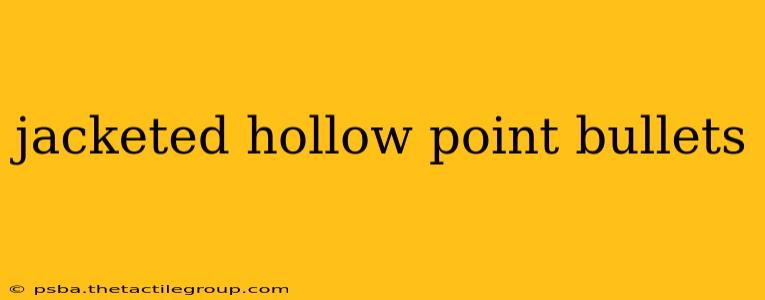Jacketed hollow point (JHP) bullets are a popular choice among law enforcement, hunters, and civilian shooters. Their design offers a unique balance of stopping power and controlled expansion, making them effective in various scenarios. This article delves into the specifics of JHP ammunition, exploring its design features, performance characteristics, and suitability for different applications.
Understanding the Design of Jacketed Hollow Point Bullets
The name itself reveals the core design elements:
-
Jacketed: A JHP bullet features a metal jacket, typically copper or copper alloy, encasing a lead core. This jacket provides stability during flight, improves accuracy, and reduces fouling in the firearm's barrel. The jacket also helps ensure consistent expansion upon impact.
-
Hollow Point: The defining characteristic is the hollow cavity at the bullet's tip. This cavity is crucial for the bullet's expansion upon impact. The design of this cavity varies greatly among manufacturers, influencing the bullet's performance. Different cavity shapes and depths affect expansion rate, penetration depth, and overall effectiveness.
Variations in JHP Design:
Manufacturers employ various techniques to optimize JHP performance:
-
Different Cavity Shapes: Some JHPs feature round cavities, while others have more complex shapes, like a tapered or "wadcutter" style cavity. These variations influence how the bullet expands upon impact.
-
Jacket Thickness: The thickness of the jacket affects the bullet's expansion characteristics. Thicker jackets lead to less expansion but potentially greater penetration, while thinner jackets facilitate more dramatic expansion.
-
Core Composition: While lead is the most common core material, some manufacturers experiment with different alloys to enhance performance or adjust expansion characteristics.
Performance Characteristics of Jacketed Hollow Points
The performance of a JHP bullet depends on a complex interplay of factors, including:
-
Caliber: Larger calibers generally deliver more stopping power.
-
Velocity: Higher velocity leads to greater energy transfer upon impact, enhancing both penetration and expansion.
-
Bullet Weight: Heavier bullets typically penetrate deeper, while lighter bullets might expand more readily.
-
Target Material: The material being struck significantly influences the bullet's behavior. Expansion might be less pronounced when striking hard targets like bone compared to softer targets like muscle.
Advantages of JHP Ammunition:
-
Controlled Expansion: The hollow point design allows the bullet to reliably expand upon impact, maximizing energy transfer to the target and increasing stopping power. This controlled expansion minimizes over-penetration, a crucial safety factor.
-
Enhanced Stopping Power: JHP bullets deliver significantly more stopping power compared to full metal jacket (FMJ) rounds, making them preferable in self-defense and hunting situations where immediate incapacitation is critical.
-
Reduced Overpenetration: The controlled expansion helps prevent the bullet from traveling through the intended target and endangering bystanders or causing unintended damage.
Disadvantages of JHP Ammunition:
-
Potential for Inconsistent Expansion: Factors like velocity, target material, and bullet design can affect the consistency of expansion.
-
Fragmentation: In some cases, the bullet might fragment upon impact, potentially leading to unpredictable wound channels.
-
Higher Cost: JHP ammunition generally costs more than FMJ ammunition.
Applications of Jacketed Hollow Point Bullets
JHP ammunition finds diverse applications:
-
Law Enforcement: Many law enforcement agencies favor JHP ammunition for its controlled expansion and reduced overpenetration risk in populated areas.
-
Self-Defense: JHPs are a popular choice for self-defense due to their enhanced stopping power and reduced risk of over-penetration.
-
Hunting: Depending on the game, JHPs can be effective hunting ammunition, offering a balance of stopping power and humane dispatch.
-
Competitive Shooting: While less common than FMJ in some disciplines, JHPs are used in certain shooting sports.
Choosing the Right Jacketed Hollow Point Ammunition
Selecting the appropriate JHP ammunition requires careful consideration of the specific application. Factors to consider include the firearm used, the intended target, and the desired balance between penetration and expansion. Always consult reputable sources and ballistic data when making your selection.
Disclaimer: This information is for educational purposes only and should not be considered professional advice. Always handle firearms safely and responsibly, adhering to all applicable laws and regulations. Consult with qualified professionals for guidance on firearm safety and ammunition selection.

